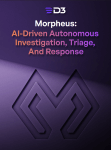Siloed security refers to a situation where different security tools and processes operate independently, without effective communication or data-sharing between them. This fragmented approach is common in many organizations, often due to the gradual adoption of security solutions over time, each chosen for its specific capabilities without considering overall integration.
Vendor-Agnostic vs Vendor-Neutral: A Concise Definition
A vendor-agnostic solution refers to a platform that facilitates seamless integration and cooperation among diverse security tools that are not limited to, or dependent on, the products of a specific manufacturer. In other words, a vendor-agnostic solution can be implemented with various off-the-shelf hardware or software, offering flexibility and independence from any single vendor’s ecosystem.
While they are often used interchangeably, keep in mind that a vendor-agnostic solution is not the same as a vendor-neutral solution. While both terms emphasize independence from specific vendors, “vendor-agnostic” is more about compatibility and flexibility, while “vendor-neutral” emphasizes impartiality and unbiased selection.
The Pitfalls of Siloed Systems
Siloed security environments create several significant challenges:
- Blind Spots: When security systems don’t communicate, they can miss or ignore critical threats that only become visible when data from multiple sources is correlated.
- Delayed Response: Each siloed system may respond to threats independently, leading to delayed and uncoordinated response efforts.
- Resource Inefficiencies: Repetitive tasks across different tools increase workloads and reduce operational efficiency.
- Complex Management: Managing multiple, disjointed systems complicates policy enforcement and overall security governance.
“Every one of us are playing a risk management game every day. And we have to be better than bad guys,” says David Barton, CTO at master MSSP High Wire Networks, in a recent webinar on the benefits of open and agnostic security solutions. He highlighted the downside of choosing SOC tools that don’t talk to each other. “When you’ve got these disparate tools that don’t share data, that don’t have API controls, that are a standalone point solution…” says Barton. “It’s hard, and in some cases, extremely difficult and impossible in some cases to be able to correlate that behavior and build a response that drives the outcomes that we’re looking for.”
“If you’re going to play defense, it’s good to have opening agnostic tool sets that mesh with commercial tool sets,” says Tony UV, CEO of VerSprite Security, in the same webinar.
Bridging the Gaps with SOAR
Vendor-agnostic Security Orchestration, Automation, and Response (SOAR) platforms offer a comprehensive solution to these challenges. By integrating disparate security tools, regardless of their vendor, SOAR platforms create a unified security ecosystem that enables:
- Centralized Visibility: SOAR allows for a consolidated view of all security alerts and incidents, helping to identify and address blind spots.
- Automated Workflows: By automating routine tasks and orchestrating complex workflows, SOAR enhances response efficiency and accuracy.
- Improved Communication: SOAR platforms facilitate communication between different security tools, enabling a more coordinated response to threats.
- Customizable Integration: The vendor-agnostic nature of SOAR means it can be tailored to fit any combination of security tools, making it adaptable to various organizational needs.
Case Example: SOAR in Action
Consider a scenario where an organization faces a sophisticated cyber attack. The attack is initially detected by the intrusion detection system but requires input from endpoint protection and network monitoring tools for a full assessment. In a siloed setup, this would require manual coordination, leading to delays. With a SOAR platform in place, these tools are integrated; the SOAR system automatically gathers necessary information, initiates containment, and keeps a consistent record for auditing and reporting, all in a fraction of the time.
Consolidate without Compromise with SOAR
The strategic importance of vendor-agnostic SOAR in modern cybersecurity cannot be overstated. By breaking down the barriers of siloed security systems, SOAR platforms not only enhance the efficiency and effectiveness of already deployed tools but also empower organizations to adapt to evolving needs. In a world where cybersecurity challenges are increasingly complex, the unifying capabilities of SOAR emerge as a critical element to consolidate separate security tools without compromising best-in-class solutions.
Previously In this Series:




